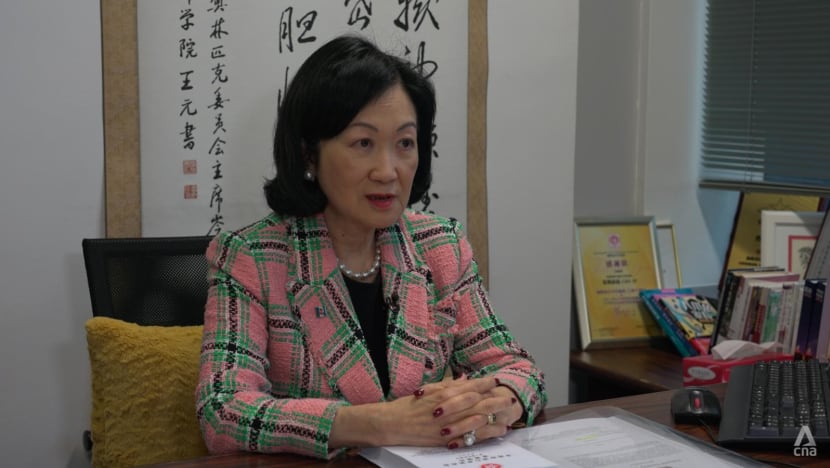‘No climate of fear in Hong Kong’: Top lawmaker Regina Ip on what has changed since 2019 protests
CNA’s Deborah Wong speaks to Regina Ip, convenor of the Executive Council of Hong Kong, about national security measures that have been introduced since the 2019 protests.

Mrs Regina Ip, convenor of the Executive Council of Hong Kong, speaks to CNA during an interview.

This audio is generated by an AI tool.
Five years ago, Hong Kong went through its worst political crisis in decades when violence erupted in the city over a controversial extradition Bill.
Protestors took to the streets in June 2019 to demand the withdrawal of the Bill, which would allow people to be sent to mainland China for trial. This eventually became the largest series of demonstrations in the Chinese special administrative region’s history.
In the years that followed, Hong Kong introduced various national security measures to rein in radicalism and pro-independence activities.
CNA spoke to Mrs Regina Ip, who is convenor of the key decision-making Executive Council of Hong Kong as well as a Legislative Council member, on Jun 5 to find out what has changed.
Mrs Ip served as Hong Kong's secretary for security from 1998 to 2003. Then, she courted controversy for advocating the passage of national legislation to implement Article 23 – a national security law that was eventually passed earlier this year.
CNA: Let’s talk about the thought process behind various national security law schemes. Could you just give us an understanding of whether the decisions were difficult in terms of getting a unanimous vote from policymakers?
Regina Ip: I tried to implement Article 23 back in 2003.
I think I failed because we failed to control the narrative, and we failed to control the media reaction. But the key reason was we did not have enough votes. One key pro-government party pulled the plug, so we did not have enough votes.
But now, this time is different.
After the 2019 riots, I think the great majority of Hong Kong people fully understand it’s important to protect national security. Otherwise, we won't have a day of peace and quiet. And the legislature is rid of the anti-China elements who have been opposing anything to do with China.
So, we managed to complete the Bill scrutiny in seven days and enacted a law on Mar 19, but during the Bill scrutiny process – I’m a member of the Bills committee – we raised more than 1,000 questions, and the government accepted 91 amendments.
CNA: Did it come as a surprise to you that the Bill took a short amount of time to be passed during that period?
Regina Ip: When the government consulted me, my advice was not to do a three-month consultation. As short as possible, because now people are fully aware of the principles and purpose of national security legislation.
And with any piece of legislation, the longer, the more time you spend poring over it, you’re bound to find more loopholes. People are bound to pick different loopholes, so to get it done, a short consultation period is adequate.
CNA: But of course, some quarters of society still believe that the red line is unclear.
Regina Ip: The red lines will come out from the court judgments. You will only find out the red lines after a law has been applied and tested in court.
For example, the first case in which a young man was prosecuted for secession, advocating Hong Kong independence – the case of Tong Ying Kit, you know, a young man who charged at the police on a motorbike with banners saying: “Liberate Hong Kong, Revolutions of the Times”. The court ruled that these words are secessionist, they mean promoting Hong Kong independence.
So clearly, the red line is there. If you do it, you advocate. If you go to a crowd and say: “Liberate Hong Kong, this is revolution of the times". That says, clearly out of bounds.
So the red lines will come out of court judgments, you know, and they are coming out bit by bit.
The government has explained many times – in criminal law, the key elements are a criminal intent. You do something intentionally, and there has to be some action.
For example, during our scrutiny of the Bill, somebody asked: "If I have a pile of Apple Daily newspapers’ front page advocating Hong Kong independence under my bed, I forgot about it – would I be accused of possession of seditious materials now?
If you left it under your bed by accident? Or if you keep it … for teaching law, what is the law on sedition? Then you don't have criminal intent and you are not doing anything to stir up hatred, then you can’t possibly commit an offence.
So the government … all of us have been trying very hard to explain the nature of criminal law.
I think people who are concerned should look at the law. The two elements in criminal law are mens rea, meaning criminal intent, and actus reus, meaning you have to do something.
Also, look at the numbers in the past four years. Ever since this law has been enacted, how many people have been arrested? 297. And how many have been convicted or pleaded guilty? 120.
There has been a recent arrest under our new law, this homegrown law, but it's the same group of people. So, the national security law is really irrelevant to most people, unless you have an intent to endanger national security.
So, it’s a very small number of bad actors intent on endangering national security. Other people have no reason to worry.
CNA: We talk about the international impact – for instance, there has been criticism from the West that national security measures are creating a climate of fear.
Regina Ip: There is no climate of fear in Hong Kong.
There are still 84,000 Americans in Hong Kong; 1,300 US enterprises; 300,000 Canadians; and large numbers of Australians. They know they are safe and not vulnerable in Hong Kong.
Of course, the Western media has been highly biased. They frame these bad actors as freedom fighters, you know, people who fight for democracy or freedom. Actually, the reality is very different.
Of course, this sort of negative publicity has taken a toll on Hong Kong but our tourism numbers are climbing and there is no lack of Five Eyes country officials, former officials, scholars going through Hong Kong, visiting Hong Kong. There's no problem whatsoever.
I think we must keep explaining. I do encourage the government to do more face-to-face engagements, other than just issuing a press release.
CNA: It’s now easier for the Department of Justice to appeal against acquittals as well as for early release to be rescinded under Article 23. What is the balance here, with reintegration of the young activists who took part in 2019 (protests)?
Regina Ip: The question is: Just letting young people off, without recognising the legal consequences of the damage they have done to society – is that really the best approach towards reconciliation?
Because as soon as the riots broke out, there were people who asked for amnesty – ‘just let the young people go free’.
I don't think that's a good way to reconciliation or rebuilding our society or helping these young people if they don't understand the legal consequences.
You know, during the riots, our police have not fatally injured anyone. But some young people have killed one person with a brick and set on fire one person, and these young people have left. They could not be traced.
CNA: What is the government doing in terms of making sure that they reintegrate into society and become productive members?
Regina Ip: Well, our Correctional Services Department has a rehabilitation programme – retraining and rehabilitation – and they do a good job.
But you see, our authorities have placed a lot of trust in some of these young people. One of them, Agnes Chow, was allowed to go abroad. Her passport was given back to her and she immediately went out to denounce Hong Kong.
So, can you really trust, or can all young people be trusted? They ask for leniency, but do they really understand, accept that they have damaged society and a lot of damage to our country and society?
I think people must try and understand and accept Hong Kong as it is. We are part of China, just like Guangzhou or Hangzhou. Our country’s red lines are our red lines, where we do have a different way of life. We have a capitalist system; we have far greater freedom of expression, different forms of freedoms, and much stronger protection of human rights than many other democratic societies.
I hope people will recognise and accept us as the way we are.


















